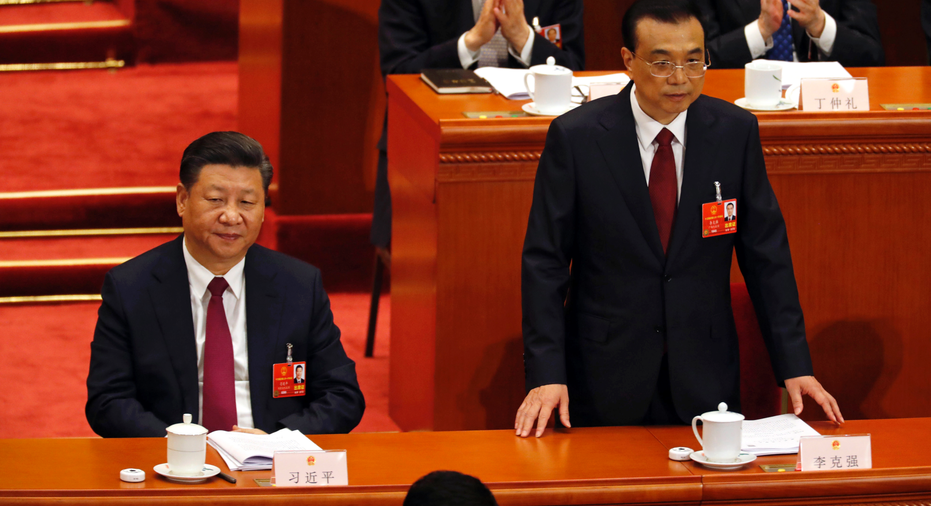China sets ambitious growth target, promises steel cuts

BEIJING – China's top economic official set a robust growth target Monday and promised more market opening and cuts in a bloated steel industry that has inflamed trade tensions with Washington and Europe.
The growth target of "around 6.5 percent" announced by Premier Li Keqiang to China's ceremonial legislature, little-changed from last year, would be among the world's strongest if achieved. The premier also promised progress on developing electric cars and other technology and better regulation of China's scandal-plagued financial industries.
The meeting of the National People's Congress is overshadowed by constitutional changes that would allow President Xi Jinping to stay in power indefinitely, but businesspeople and economists also are looking for signs Xi is speeding up reform. That follows complaints Beijing did too little while Xi focused on amassing power since becoming Communist Party leader in 2012.
"We will be bolder in reform and opening up," said Li in a nationally televised speech to nearly 3,000 delegates to the ceremonial legislature in the Great Hall of the People.
Possible developments this week include the elevation of Xi's top economic adviser, Liu He, who has told foreign businesspeople he supports free markets, to a post overseeing reform.
"The top priority over the past five years was power consolidation," said economist Larry Hu of Macquarie Capital in a report. "Now the power consolidation is close to completed. It remains to be seen how policy priority would change for the next five years."
The growth target officially is a basis for planning instead of a promise about how the economy will perform, but allowing activity to dip below that level could erode public confidence and make investors skittish.
The economy grew by 6.9 percent last year but that was supported by a boom in bank lending and real estate sales that regulators are trying to curb due to concern about rising debt. Analysts have questioned whether Beijing can hit this year's target without stimulus from bank lending and government spending, which would set back reforms aimed at nurturing self-sustaining growth and curbing debt.
Li promised Beijing would open its economy wider to foreign investors by "completely opening up" manufacturing and expanding access to other industries, but gave no details.
Foreign business groups complain previous industry-opening pledges have been diluted by conditions such as ownership limits or requirements to hand over technology that make them unappealing.
At the same time, Li tempered the market-friendly promises by affirming plans to build up state-owned enterprises that dominate most Chinese industries including energy, telecoms and finance.
"Our SOEs should, through reform and innovation, become front-runners in pursuing high-quality development," he said.
The premier promised "substantive progress" in a multi-year campaign to reduce production capacity in steel, coal and other industries in which supply exceeds demand. The United States and the European Union complain that surplus of Chinese steel and aluminum flooding into global markets depresses prices and threatens jobs.
This year's targets include eliminating 30 million tons of production capacity in the politically sensitive steel industry, Li said. It was unclear how that might affect China's annual output of about 800 million tons.
Li also promised to improve oversight of scandal-plagued Chinese financial industries and to control surging corporate debt that prompted rating agencies to cut Beijing's credit rating last year.
Last month, regulators seized control of one of China's biggest insurers, privately owned Anbang Insurance Group, amid concern about whether its debt burden was manageable. Authorities announced its founder and chairman would be prosecuted on charges of improper fundraising.
On Monday, the premier tried to defuse worries rising debt could trigger a banking crisis or drag on economic growth by repeating assurances that Beijing is "completely capable of forestalling systemic risks."
In a sign Beijing might accept slower growth, Li cut the government's budget deficit target to 2.6 percent of gross domestic product from last year's 3 percent, which would reduce the stimulus from public spending.
"The government's bottom line for economic growth is likely to be 6.3 percent," said Tom Rafferty of the Economist Intelligence Unit in a report. He said that was the minimum required to meet Beijing's goal of doubling economic output from its 2010 level by 2020.
The proposal to remove term limits for president from China's constitution has prompted concern a slide toward one-man rule will erode efforts to make economic regulation more stable and predictable.
Officials say China needs continuity as Beijing carries out long-range changes including making state industry more competitive and productive and developing profitable high-tech industry.
Li, the premier, made no mention of the constitutional change or the controversy surrounding it but promised progress on an array of politically challenging goals including the restructuring or bankruptcy of "zombie enterprises," or money-losing but politically favored companies that are kept afloat by loans from government banks.
The premier said Beijing will speed up state-led development in an array of technology fields including artificial intelligence, integrated circuits, mobile communications, aircraft engines and electric cars.
"We will develop intelligent industries," said Li.



















